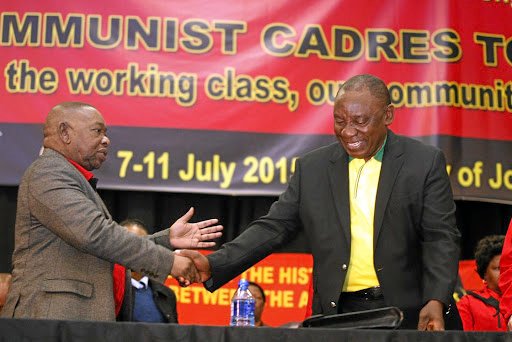Riyaz Patel
The South African Communist Party (SACP) has reacted with “serious concern” to the contents and “sudden” release of Finance Minister Tito Mboweni’s Economic Strategy Blueprint, made public late Tuesday.
In what could be viewed as a veiled grouse the SACP said it’ll “respond in detail both to the process that was followed by Mboweni, and substantively to the contents of the document.”

“For the record, the SACP has consistently campaigned against neo-liberal policy regime measures. It is this economic policy regime that has plunged the world into economic crisis and our country into the undesirable economic situation it finds itself in today,” the Party, cloaking it’s criticism, charged in a statement Wednesday.
It added that it has “noted with serious concern, from our Alliance policy making point of view, and primary mandating position in relation to deployed public representatives, the sudden release” of Mboweni’s economic growth strategy paper.
The SACP pressed home that it has consistently campaigned for measures aimed at rooting out class inequalities and poverty, and “will continue to strongly oppose any measures that have the effect of rolling back workers’ achievements.”
The SACP is planning to unpack and issue its subsequent response to the document at its Central Committee meeting early next month.
Treasury’s economic policy paper outlines that Eskom could sell some coal-powered plants to raise R450bn and allow households to sell electricity back into the grid as part of a restructuring of the state-owned power utility.
The stations could be sold through a series of auctions and would include related staff contracts, coal-supply contracts and environmental obligations, according to the National Treasury document.
“The SACP will continue to challenge such measures, regardless of their make-up, and will not allow any form of neo-liberal opportunism whatsoever to exploit our country’s economic situation,” the cryptic SACP statement added.
The Party said will further take “its perspectives” to the next Alliance Political Council as well as to the National Alliance Summit to be convened after the Council.
“It’s a rehash of everything we’ve published before.”
Former Statistician-General Dr Pali Lehohla
Former Statistician-General Dr Pali Lehohla was more direct, criticising the Treasury’s document aimed at encouraging economic growth, saying it “failed to talk to the country’s triple challenges of poverty, unemployment and inequality.“
Lehohla described the strategy paper as a rehash of old proposals with no fresh ideas on how to kickstart the economy and create jobs.
“It’s a rehash of everything we’ve published before. There is nothing new except that we have a crisis of Eskom. That’s why it’s placed disproportionate attention on the crisis of Eskom,” he said.
